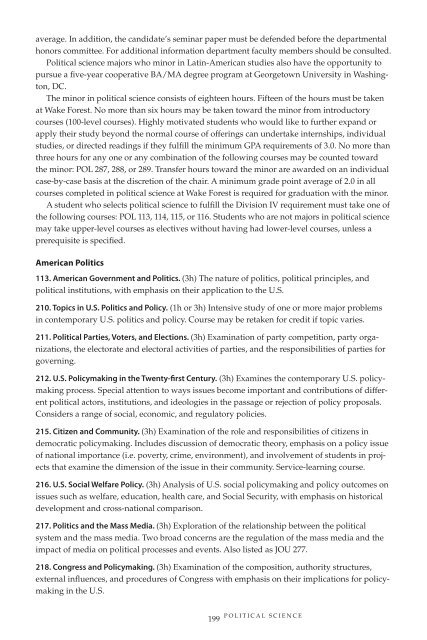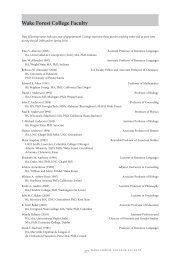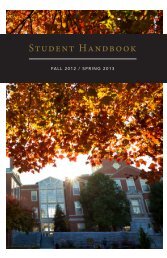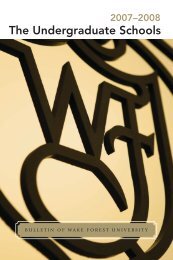theundergraduateschoo ls - Wake Forest University
theundergraduateschoo ls - Wake Forest University
theundergraduateschoo ls - Wake Forest University
You also want an ePaper? Increase the reach of your titles
YUMPU automatically turns print PDFs into web optimized ePapers that Google loves.
average. In addition, the candidate’s seminar paper must be defended before the departmental<br />
honors committee. For additional information department faculty members should be consulted.<br />
Political science majors who minor in Latin-American studies a<strong>ls</strong>o have the opportunity to<br />
pursue a five-year cooperative BA/MA degree program at Georgetown <strong>University</strong> in Washington,<br />
DC.<br />
The minor in political science consists of eighteen hours. Fifteen of the hours must be taken<br />
at <strong>Wake</strong> <strong>Forest</strong>. No more than six hours may be taken toward the minor from introductory<br />
courses (100-level courses). Highly motivated students who would like to further expand or<br />
apply their study beyond the normal course of offerings can undertake internships, individual<br />
studies, or directed readings if they fulfill the minimum GPA requirements of 3.0. No more than<br />
three hours for any one or any combination of the following courses may be counted toward<br />
the minor: POL 287, 288, or 289. Transfer hours toward the minor are awarded on an individual<br />
case-by-case basis at the discretion of the chair. A minimum grade point average of 2.0 in all<br />
courses completed in political science at <strong>Wake</strong> <strong>Forest</strong> is required for graduation with the minor.<br />
A student who selects political science to fulfill the Division IV requirement must take one of<br />
the following courses: POL 113, 114, 115, or 116. Students who are not majors in political science<br />
may take upper-level courses as electives without having had lower-level courses, unless a<br />
prerequisite is specified.<br />
American Politics<br />
113. American Government and Politics. (3h) The nature of politics, political principles, and<br />
political institutions, with emphasis on their application to the U.S.<br />
210. Topics in U.S. Politics and Policy. (1h or 3h) Intensive study of one or more major problems<br />
in contemporary U.S. politics and policy. Course may be retaken for credit if topic varies.<br />
211. Political Parties, Voters, and Elections. (3h) Examination of party competition, party organizations,<br />
the electorate and electoral activities of parties, and the responsibilities of parties for<br />
governing.<br />
212. U.S. Policymaking in the Twenty-first Century. (3h) Examines the contemporary U.S. policymaking<br />
process. Special attention to ways issues become important and contributions of different<br />
political actors, institutions, and ideologies in the passage or rejection of policy proposa<strong>ls</strong>.<br />
Considers a range of social, economic, and regulatory policies.<br />
215. Citizen and Community. (3h) Examination of the role and responsibilities of citizens in<br />
democratic policymaking. Includes discussion of democratic theory, emphasis on a policy issue<br />
of national importance (i.e. poverty, crime, environment), and involvement of students in projects<br />
that examine the dimension of the issue in their community. Service-learning course.<br />
216. U.S. Social Welfare Policy. (3h) Analysis of U.S. social policymaking and policy outcomes on<br />
issues such as welfare, education, health care, and Social Security, with emphasis on historical<br />
development and cross-national comparison.<br />
217. Politics and the Mass Media. (3h) Exploration of the relationship between the political<br />
system and the mass media. Two broad concerns are the regulation of the mass media and the<br />
impact of media on political processes and events. A<strong>ls</strong>o listed as JOU 277.<br />
218. Congress and Policymaking. (3h) Examination of the composition, authority structures,<br />
external influences, and procedures of Congress with emphasis on their implications for policymaking<br />
in the U.S.<br />
P O L I T I C A L S C I E N C E<br />
199






